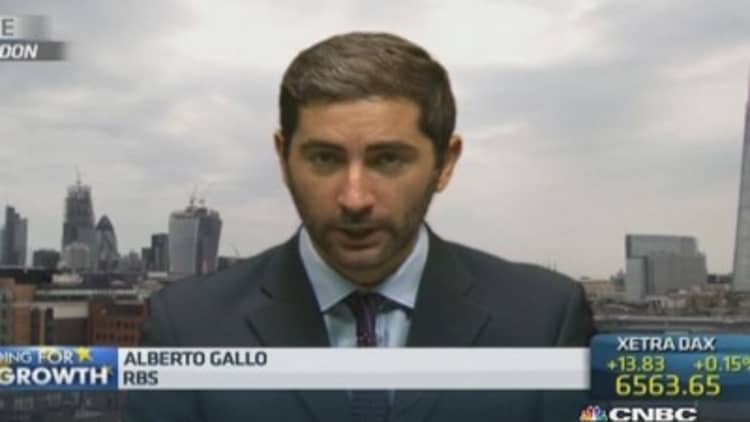Greek Prime Minister Antonis Samaras comfortably won a confidence vote in parliament in the early hours of Saturday after securing the support of all 155 conservative and Socialist lawmakers in his coalition.
Samaras called the vote to force lawmakers to back his plans to exit an international bailout program early.
Samaras' government had been plagued by the prospect of snap elections early next year if the prime minister failed to gain the support of opposition lawmakers for his candidate for president in elections early next year. A promise to exit the painful program early was key in securing that backing.
Read MoreGreece rejects bailout talk, eyes growth
A potential early exit from the bailout program -- which imposed tough austerity measures on the country -- has already rattled investors' nerves however.
Greek bond yields rose to a six-month high this week ahead of Friday's confidence vote in parliament. The yield on 10-year paper currently stands at around 6.6 percent.
Greece is hoping to be able to meet its funding needs through the debt markets, rather than call on the Troika of lenders – the European Commission, European Central Bank (ECB) and International Monetary Fund (IMF).
Demand has been getting stronger for Greek paper since the country returned to capital markets earlier this year after a four-year exile. But many analysts remain concerned about the country's ability to fund itself without the help of its partners.
Read MoreGreece plans new bond sales, confirms 2015 growth target
"At current levels, Greece would at the very least need a large credit line. S&P also stated that it does not expect Greece to be able to sell 43 billion euros of instruments over the next 15 months some days ago", David Schnautz, a director of interest rate strategy at Commerzbank told CNBC.
A smart bet?
On the other hand, and despite the risk of snap elections early next year, investors don't want to give up on the Greek bet just yet.

"It's a very difficult situation but investors will be wary of being short Greek debt or underweight just in case the ECB undertakes QE (quantitative easing)", says Gary Jenkins, Chief Credit Strategist at LNG Capital.
Monetary easing by the ECB would push up the price of Greek bonds, which moves inversely to yields.
Read MoreGreek debt upgraded to 'B' by S&P; Recovery 'weak'
ECB President Mario Draghi announced last week that the bank would include Greek assets in its asset-backed security and covered bonds purchase program, despite the country's debt rating which is in junk territory, as long as there was a European program in place.
The European part of the bailout program comes to an end in a couple of months and Greece will continue to be funded only by the IMF until 2016. The IMF's chief Christine Lagarde said for the first time openly on Thursday that she would like to see Greece have some "precautionary support" moving forward. She was speaking at a press conference ahead of the IMF's annual meeting this weekend.
"Together with the rating situation of Greece and the ECB's guidance to only violate its rating requirements if countries are part of an adjustment program, Greek bonds could be left in the rain in case fully-fledged QE could be employed by the ECB. Otherwise, given their very limited 'free float', QE should be a massive boost for Greek bonds", says Schnautz.
Read MoreWill 2014 be the year Greece starts growing again?
Thanos Vamvakidis, head of European G10 FX strategy, says current global market volatility does not favor Greek sovereigns, despite the country's fundamentals picking up. "The market is already long Greece government debt. Globally, the market is unwilling to increase its exposure to carry trades, part of which is also Greece, at a time that the Fed will soon start raising rates," he said.
In its 2015 draft budget released on Monday, the Greek finance ministry announced its plans to sell more debt in the form of a seven- and ten-year bond.
The Troika, which left Athens on Wednesday, is expected to be back in the country for further talks after the results from the Greek bank stress tests are released later this year.
Reuters contributed to this story

